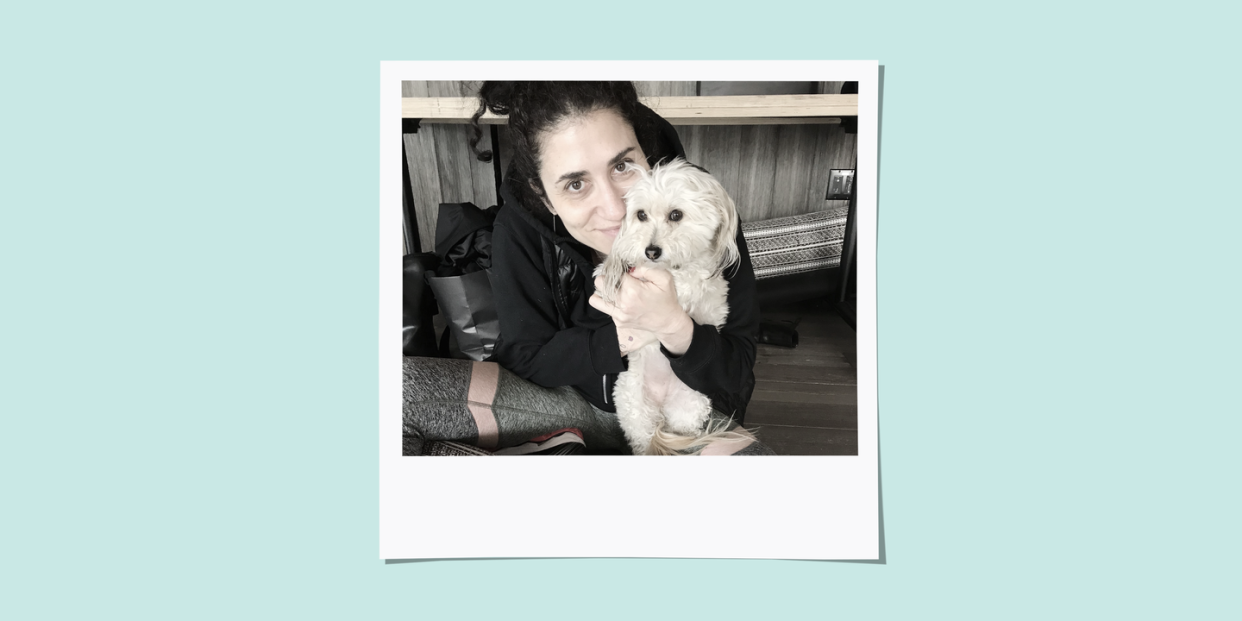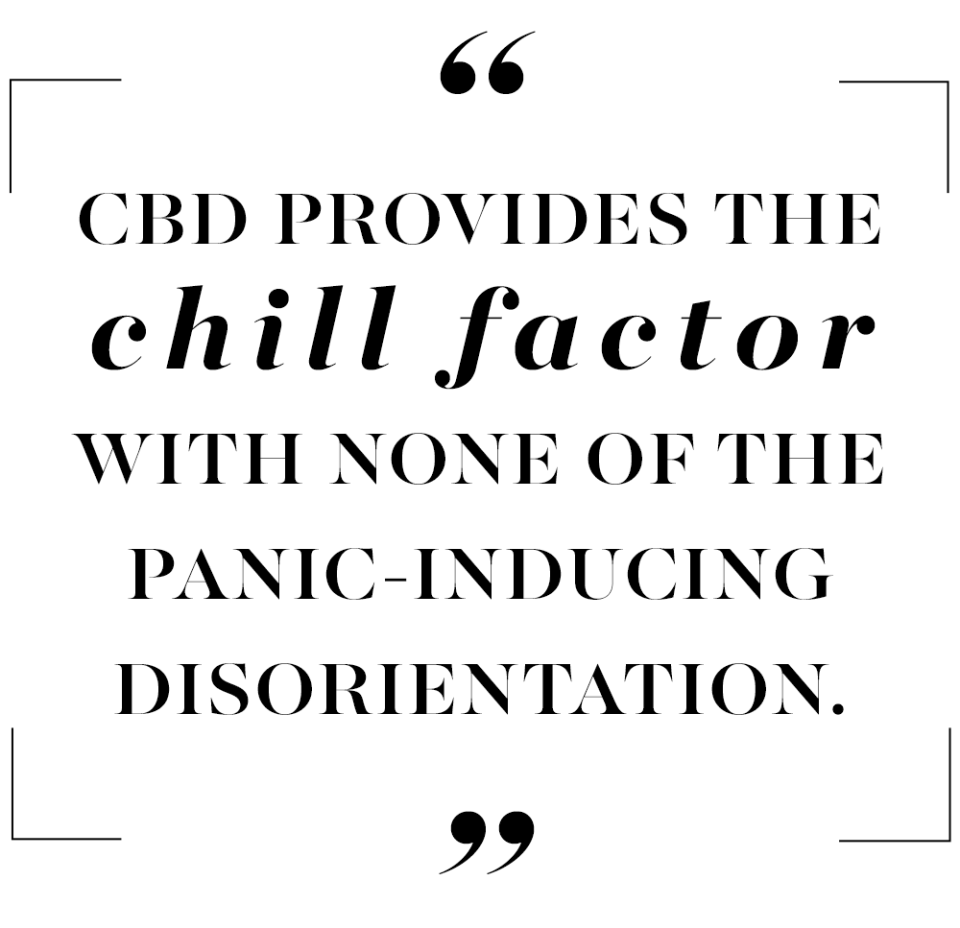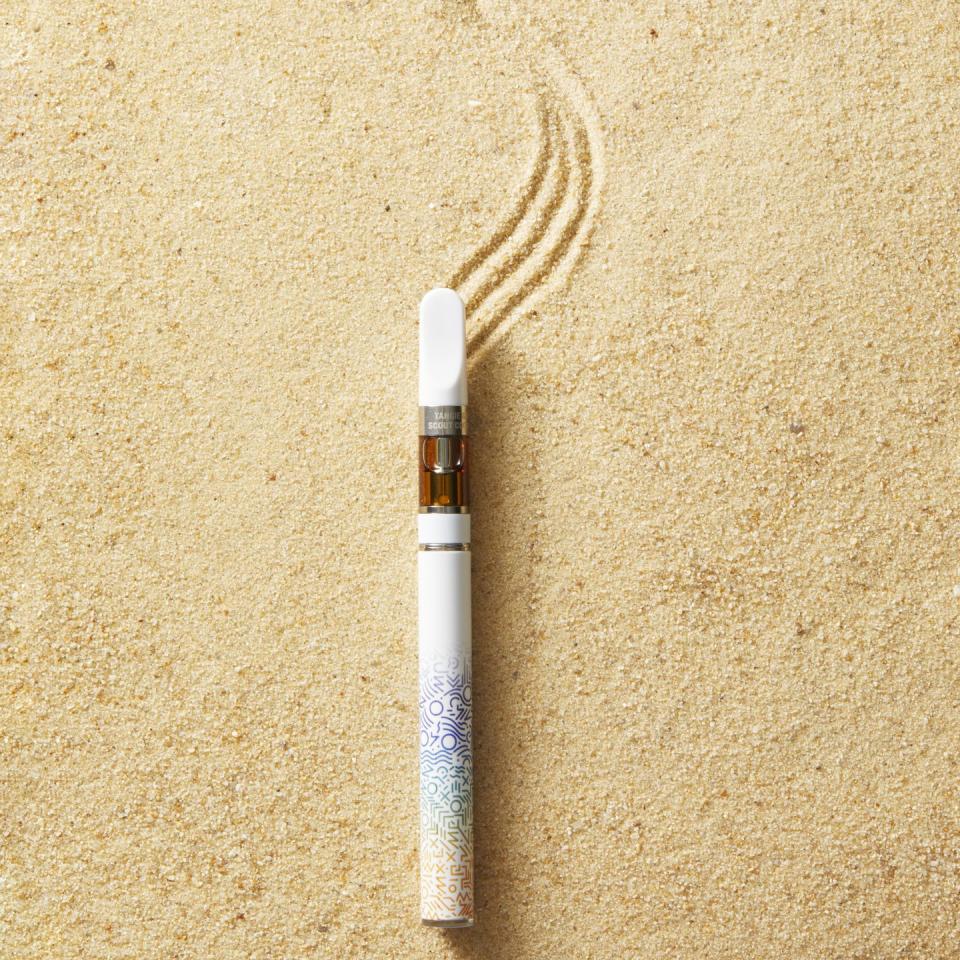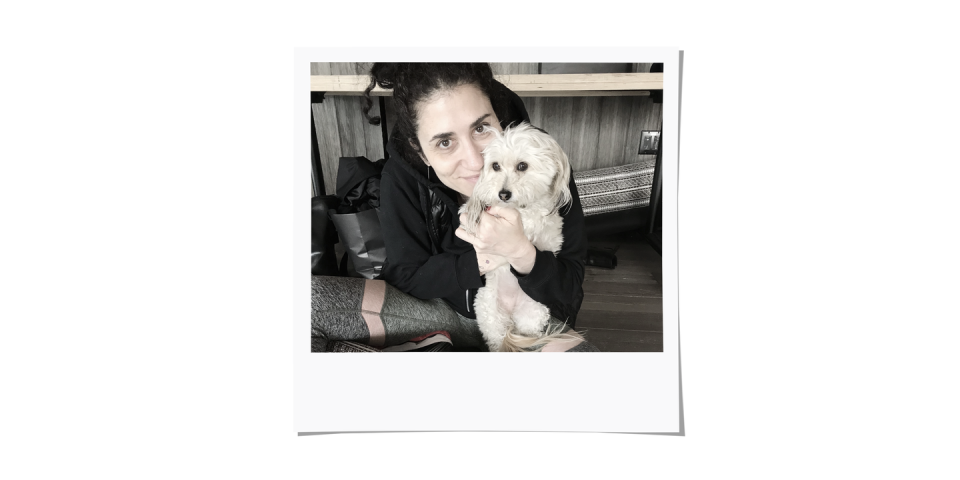I Tried CBD Oil to See If It Really Works for Anxiety

"Hearst Magazines and Yahoo may earn commission or revenue on some items through the links below."
Anxiety is not literally my middle name (it’s Alexandra) but it could be. Like my name, anxiety has been with me always. And until I had kids, everyone — including me — thought that I was simply a really good planner, a hyper-conscientious worker, and one of those 10-steps-ahead people who wards off problems before they occur.
No one tells you this, but having children can ratchet up the mind-grind exponentially, turning it into a major liability. When my twins came along 16 years ago, my constant mind-grind became a liability — it was hard to simply enjoy their adorableness, because I was so distracted by the next thing I urgently needed to make happen or that could go horribly, catastrophically wrong.
For those who are not anxious puppies: Anxiety physically feels like fear, except that what you’re afraid of isn’t actually happening. Let’s say the pediatrician sat you down and told you that your kid had a serious illness. Understandably, you’d freak — your heart would beat faster, your face would flush or go pale and your chest might tighten, making it hard to breathe. Perhaps your brain would even glitch briefly, making you feel far away. That’s how it is to have anxiety, except that you’re reacting to the idea that your child could conceivably become sick one day in the future, and it’s hard to shake the thought — it feels as bad as if it were happening in that moment. Anxiety can be triggered by some-thing obvious, like reading a news report, or seemingly nothing at all.
For me, anxiety drained a lot of the pleasure out of being a mom. When my kids were little and ran out giggling ahead of me in the playground, I’d flash to the thought of them splatting out and permanently marring their wee soft faces. If our food didn’t arrive quicklyat a restaurant, I’d sit, braced for a screaming melt down and the wrath of other diners — even as the kids sat bliss-fully coloring. Now that they’re older, my anxiety swirls around what could happen to them if they do the dumbass, risk-taking things I did as a teenager. Never mind that they have decent judgment and most teens survive into adulthood — I obviously did. Tell that to my anxiety.
And then, three years ago, my unquiet mind — which I had learned to manage fairly well through exercise, meditation, an antidepressant, and therapy — really turned up the volume. What’s going on in the news, especially politics, can send me into a state, and all the #MeToo stories roused some sleeping PTSD around events that I’d shoved into the recesses of my brain. I slept poorly, which kept me on edge during the day. My doctor prescribed lorazepam, the generic form of the anti-anxiety drug Ativan, and that helped in a pinch, but it also made me spacey. So I asked her what she knew about cannabidiol (CBD), one of hundreds of compounds in the cannabis plant
What is CBD oil, and is it legal?
The answer: not much. This was just over a year ago, before CBD was being sold everywhere from the organic manicurist’s office to the local bodega. But she did know a fair amount about marijuana, CBD’s more famous cousin: She said some patients found that pot helped their anxiety, allowing them to relax and sleep better, but others said it made their anxiety much worse. Having tried it decades ago (see “dumbass teenage antics” mentioned earlier), I knew it turned me into a giant Oreo-sucking slug who panicked that she’d drown if she didn’t swallow her saliva faster. So fun.
THC, short for delta-9-tetrahydrocannabinol, is the best-known compound in cannabis — the one that makes you high (and, in my case, paranoid). But straight CBD oil, I’d read, does not. It was said to provide only the chill factor, and for some a sense of alertness, with none of the disorientation.

I decided to do some research. I called a friend of a friend, Lynn Parodneck, MD, a former OB/GYN in Bedford, New York, who now exclusively treats medical marijuana patients for things like chronic pain, Parkinson's, and PTSD. She explained that CBD is found in both marijuana (illegal on a federal level, but legal in certain states) and hemp (now legal everywhere on a federal level, thanks to the 2018 Farm Bill; but there are some grey areas, which I'll explain in a sec).
Whichever type of cannabis plant it comes from, generally speaking, "if it has less than 0.3% THC, it’s considered hemp-derived CBD, and in general it is being sold over the counter," Dr. Parodneck explains. It can also be shipped to all 50 states if ordered online. But there is a caveat: There are still areas in which CBD is not considered legal, as it is taking time for local laws to catch up with federal law, so be aware of the rules where you live. In some areas, folks have occasionally been busted for having CBD products, either because it comes from a species of the cannabis plant, which remains illegal in some places, or because even the tiniest amounts of THC are entirely illegal — so check the rules where you live and travel. (Aaaannnd... as if that's not complicated enough, now that the FDA has approved the first CBD-based prescription medication for rare forms of epilepsy, CBD is considered a drug and — guess what? — it's illegal to sell food products containing drugs, such as CBD-infused coffee or juice shots. How strictly that's enforced can also be wonky, depending on where you live.) Oh, and you should know that it's possible for CBD to show up on drug tests for up to 30 days, because even if it says "pure CBD" on the label, it may still contain a teensy-tiny bit of THC.
In any case, CBD derived from pot, she says, contains other compounds that are thought to enhance the effectiveness of the CBD, something known as “the entourage effect.” But CBD from hemp can also be effective, she says.

How does CBD oil work?
Effective for what, you ask? Research is preliminary, but CBD seems to help with pain and certain neurological conditions. It is anti-inflammatory, antibacterial and more, says Joseph Cohen, D.O., a cannabis doctor in Boulder, CO. Taken orally — as a tincture, in a capsule or vaped — some find that it can also alleviate anxiety and depression by working on the body’s endocannabinoid system, which plays a role in self-regulation, mood and relaxation.
Here’s the deal with the endocannabinoid system: Our bodies produce endocannabinoids every day, says JosephMaroon, M.D., clinical professor and vice chairman of neurosurgery at the University of Pittsburgh Medical Center. These bind to receptors all over our bodies, says Dr. Parodneck; it may be that people who don’t produce enough cannabinoids themselves are the ones who benefit from exogenous phytocannabinoids — i.e., taking CBD from plants — which then bind to those receptors. Another theory is that taking CBD allows our bodies’ naturally produced cannabinoids to stick around longer, prolonging the calming effect, says Dr. Maroon.
The thing is, there is not a lot of clinical data on CBD, because until the Farm Bill was passed last year, all cannabis (whether it contained lots of THC or not) was classified by the Drug Enforcement Agency, along with heroin and Ecstasy, as a Schedule 1 drug — the most restrictive classification. That made it hard for medical researchers to study it (though the FDA recently approved the first CBD-based drug for rare forms of epilepsy).
But doctors in states where cannabis is legal are hearing positive reports from their patients about CBD helping with anxiety, and scientists feel confident that it is not dangerous: It won’t damage vital organs even at doses as high as 5,000 mg a day, says Jahan Marcu, Ph.D., director of experimental pharmacology and behavioral research at the International Research Center on Cannabis and Mental Health in New York City, and nobody has died simply from overdosing on a cannabis product, including marijuana.
Are there side effects to CBD oil?
That information convinced me to at least try it, but I wanted to know what side effects to look out for. While CBD is tolerated well by most people, Dr. Parodneck advised me to “start low and go slow.” "Everybody is different and what kind of effects they’ll see depends on what their underlying condition is, as well as their tolerance," she says.

If you have a history of smoking marijuana, some strains of which are relatively high in CBD, you may develop a tolerance, meaning you have to ingest more to get the same effect.
"When the body gets used to CBD, it makes fewer endogenous cannabinoids," so you may need more CBD to feel anything. Too much, however, can give you stomach upset or make you tired. Some people feel a big fat nothing.
For me, a non-pothead, and for most adults, "10 milligrams is fine to start," says Dr. Parodneck. If that amount doesn’t help, she advised, I was to increase my dose in a week. "If it’s too much, you’ll feel sleepy or have diarrhea, which means you should go back to where you were the week before." She recommended I write down what I took when and how I felt, to see if it was working. (If you are going to try CBD, be sure to tell your doctor, because it may interact with certain medications such as blood thinners.)
What form of CBD is best and how much should I take?
So off I went, first trying a brand a friend recommended. I took 10mg of a CBD tincture at around 11 a.m., held it under my tongue for a minute as advised, and then waited to feel like the secretly chill person I know I am deep down inside. Nada. I did this every day for a week and didn't notice a difference.
The next week I tried the same thing, but also bit a 10mg CBD gummy in half, bringing my dosage up to 15mg. After a week of this, I thought maybe I felt a bit calmer an hour or two after taking it...but I couldn’t be sure.

Then one day the following week, another friend gave me a hit from a CBD-oil vape pen at a moment when I was starting to panic about being late to our movie. Within less than a minute, I felt a de-escalation, and after a few minutes, I felt noticeably, appreciably calmer. I reported back to Dr. Parodneck. "That makes sense," she said. "When you vape, 50% of the product gets utilized. With edibles, it’s between 10 and 20%, and it takes longer to kick in because your body must metabolize it."
Does CBD work for anxiety?
Since then, I’ve been vaping between one and three hits each morning, which helps me feel subtly but noticeably calmer as I organize and set out for my day, and I also keep my vape pen on hand for emergencies. If something happens that amplifies my panic, I step outside and take a hit. The CBD also seems to help me with the dramatic, intrusive thoughts that come with my PTSD, and it lets me be more in the moment, because I’m not constantly anticipating what might go terribly, horribly wrong. I still meditate and do all the other stuff, but CBD is one more thing that helps me.
Where can I find CBD oil?
But here’s the thing: It’s not for everyone and all CBD products are not created equal — not by a long shot. I get my vape cartridges from a small vendor Dr. Parodneck recommended, but she cautions that because CBD quality varies wildly depending on the manufacturer, it’s buyer beware. A 2017 Journal of the American Medical Association study found 43% of the CBD products that the researchers ordered online had more CBD than indicated, while 26% had less. Some even had more than a trace of THC.
“There’s a 75% chance of getting a product ordered or available online where the CBD is mislabeled,” says Marcu, one of the study’s coauthors. Adds Dr. Maroon, “Buying from a reputable manufacturer is crucial, because it matters how the plant is cultivated and processed.” One clue is cost: If it’s too cheap, it may not be the real deal. My half-gram vape cartridge is $50, but it lasts a long while, and for me that’s a very small price to pay to be able to enjoy my kiddos.
The wisest thing to do is to buy CBD made from American-grown hemp, ideally from a state such as California or Colorado (Dr. Parodneck likes this one). Why? If you purchase CBD oil in the U.S. from one of the 10 states where both recreational and medical cannabis use is legal, there’s a better chance you’ll get a higher-quality product than if you buy one made with hemp-derived CBD oil imported from abroad, says Martin Lee, director of Project CBD, a nonprofit that promotes medical research on CBD.
Also note the amount of CBD and THC per dose. There’s no definitive amount that’s appropriate for everyone, but the ratio of CBD to THC will indicate how psychoactive the product is and if it’s legal in your state. The more CBD compared with THC, the less of a high, and vice versa. “Managing psychoactivity is key to successful cannabis therapy,” says Lee, author of Smoke Signals. “Amounts should be made clear on the label and lab-certified so people know what’s helping them and what’s not.” Finally, look for “full-spectrum” or “broad-spectrum.” These terms mean that all or most of the components that can be extracted from the hemp plant are in the oil. The wider the range included, versus just CBD, the greater the potential medicinal benefit of the product, says Lee.
In no way would a few hits of CBD from my vape pen be enough to manage my world-class worrying on its own, but I'm grateful to have another figurative chill pill in my figurative medicine cabinet. I'm still a little self-conscious about taking a toke in front of other people — I'm a health editor and don't want anyone to think I vape anything harmful! — so I step outside my office and skulk in the doorway feeling like a sneaky teenager. At some point, however, I predict that CBD-using anxious puppies like yours truly will be able to live out loud and proud.
You Might Also Like


